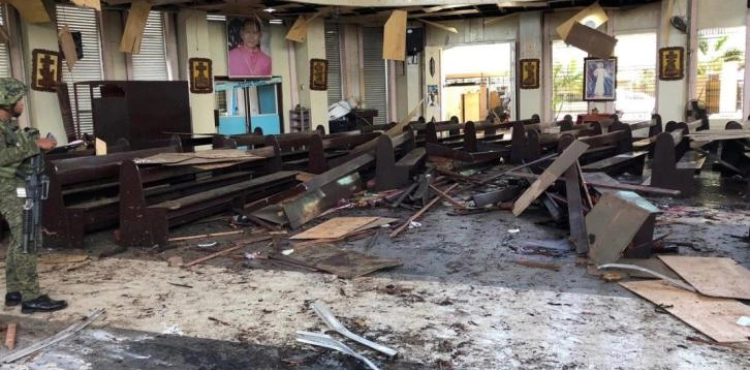At least 18 people were killed in two blasts Sunday targeting the Jolo cathedral on the island of the same name in the southern Philippines, which remains the stronghold of the Abu Sayyaf Islamic group.
Two days after a referendum was announced Monday, a large majority backed the establishment of the Pangsamoro Autonomous Region in the southern Philippines as part of the peace process with the Muslim insurgency.
The first bomb exploded during the mass in the Cathedral of the Lady of Mount Carmel in the center of Jolo, the largest city on the island, said army spokesman in the region Lieutenant Colonel Jerry Bisana.
A second explosion took place outside the cathedral, in the garage, as the soldiers arrived.
Photos posted by the army showed the doors of the cathedral, its windows shattered and its seats inverted. An AFP photographer saw a number of bodies on the ground.
A spokesman for Philippine President Rodrigo Duterti condemned the blasts, saying it was a "terrorist act."
"We will pursue to the farthest point in the world the brutal executors of this brutal crime until the murderers are brought to justice and put behind bars," Salvador Panillo said in a statement. "The law will not please them."
Lieutenant-Colonel Jerry Bisana said five soldiers, a Coast Guard officer and 12 civilians were killed in the blasts, which also wounded 83 people.
For his part, the police chief of the region, Graciano Micharis, killed 20 people and wounded 81. The second bomb was stored in a motorcycle box parked outside the cathedral.
The organization published a statement in which he confirmed that suicide bombers blew themselves up Sunday inside the church and in a garage outside, according to Sait.
Prior to the organization´s announcement of the attack, the authorities indicated that the Abu Sayyaf group might be involved in its execution.
"When you talk about terrorism in the Sulu region, the first suspect is always a Abu Sayyaf, but we can not rule out the possibility of others," Bisana said.
The island of Jolo is one of the main strongholds of the Abu Sayyaf group specialized in kidnappings. It is also accused of the worst attacks in the archipelago, especially an attack on a ferry that killed more than 100 people in 2004.
The Abu Sayyaf Islamic group is part of a separatist Muslim insurgency. It was founded in the 1990s with funding from a member of the family of Osama bin Laden´s founder.
Jolo is part of the autonomous region of Bangsamoro, which was recently created following a referendum.
The establishment of this area on the land inhabited by a Muslim majority in the archipelago of the Catholic majority is aimed at restoring peace after decades of conflict that has caused tens of thousands of deaths.
Muslims took up arms in the 1970s to demand autonomy or the independence of the southern Philippines, which they consider the land of their ancestors. The uprising killed 150,000 people.
The main rebel group of the Moro Islamic Liberation Front (MILF) signed a peace deal with the government in 2014 to grant autonomy to the Muslim minority in some parts of the southern island of Mindanao and islands in the far southwest.
Under the agreement, 2.8 million people were invited to vote in the region on Monday to set up a new autonomous region called Bangsamoro. About 254,600 people voted against it, the electoral commission said Friday.
The process, which began in the 1990s, does not include Islamic organizations such as Abu Sayyaf.
And the voice of the Sulu region where Jolo is located, in general against the establishment of the new zone.
National Security Adviser Hermon Esperon, who attributed the attack to "extremist criminals", said that "peace must prevail over war." "We will not disappoint people in peace."












